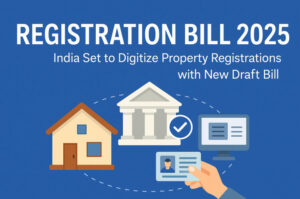GS2 – Governance

Context:
The Ministry of Rural Development (MoRD) has released the Draft Registration Bill, 2025 for public feedback. It aims to replace the century-old Registration Act of 1908, introducing a modernized legal framework to enhance land registration, improve transparency, and promote digital record-keeping.
Why the Bill is Needed
- Outdated Procedures: The current law relies heavily on manual processes requiring physical visits to Sub-Registrar offices and paper documentation, causing delays and inconvenience.
- Rising Transaction Complexity: With property dealings becoming more frequent and intricate, there is a need for faster, more efficient systems.
- Incomplete Digitisation: While some states have adopted online features like e-document uploads and digital identity verification, these are constrained by the limitations of the old Act.
- Demand for Reliable Records: Government agencies and private parties alike require trustworthy and tamper-proof property records.
Key Provisions of the Bill
- Dual Registration Modes
- Enables both online and offline registration.
- Aadhaar-based or offline identity verification allowed, ensuring Aadhaar is not mandatory.
- Expanded Mandatory Registration (Section 12)
- Adds several documents to the list of compulsory registration:
- Agreement of Sale
- Power of Attorney (POA)
- Sale Agreement
- Mortgage by deposit of title deed
- Makes it compulsory to register merger/demerger documents under the Companies Act, 2013.
- Optional Registration (Section 13): Allows registration of unspecified documents, offering flexibility but also legal ambiguity.
- Institutional Reforms
- Introduces new positions such as Additional and Assistant Inspector Generals of Registration (IGR).
- Government can assign them specific roles and responsibilities in addition to the existing IGR framework.
- Refusal and Cancellation Provisions
- Grounds for refusal include:
- Missing translations
- Content alterations
- Late submission
- Applicant ineligibility
- The IGR is empowered to cancel registrations based on fraudulent or illegal content, with written reasons and appeal mechanisms.
- Reduced Penalties
- Maximum imprisonment for offences lowered from seven years to three years, with or without a fine.
Concerns and Challenges
- Cybersecurity Risks: Storing sensitive data digitally and using e-signatures raises concerns about data breaches and system vulnerabilities.
- Delegation to CSCs: Granting Common Services Centres authority over complex tasks like stamp duty valuation or title transfers may lead to legal inconsistencies.
- Ambiguity in Optional Registration: Section 13’s broad language might create confusion over what documents can be optionally registered.
Way Forward
- Robust Implementation: Ensure effective roll-out mechanisms to prevent delays and procedural gaps.
- Strengthen Digital Infrastructure: Prioritise cybersecurity and data protection to secure digital records and signatures.
- Policy Synergy: Align with Digital India and property rights reforms to make property transactions simpler, faster, and more transparent.




